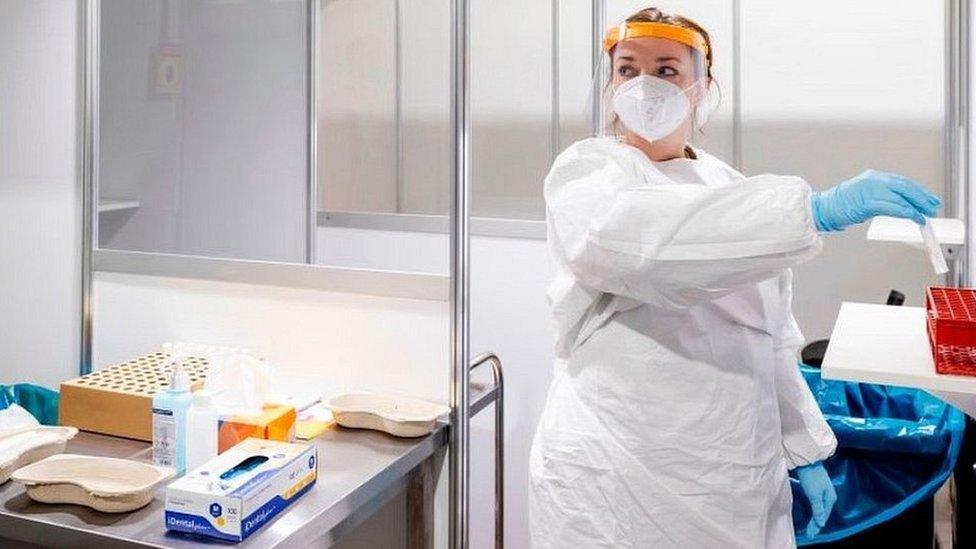Dutch election: PM Mark Rutte claims victory and fourth term
- Published
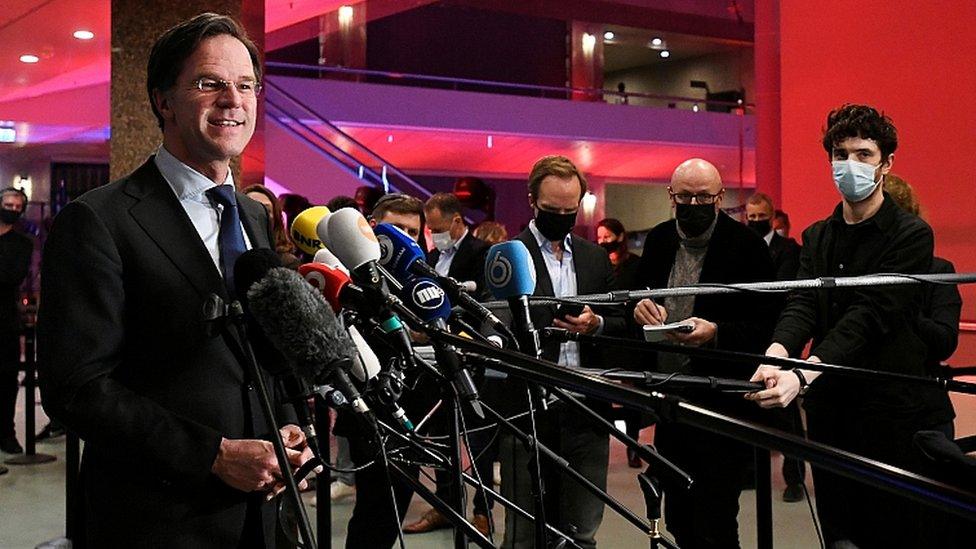
Mark Rutte vowed to use his fourth term to rebuild the country after the pandemic.
Dutch Prime Minister Mark Rutte's party has won the most seats in parliamentary elections, projections show.
Victory hands Mr Rutte a mandate to form a new coalition government led by his centre-right VVD party, with a fourth term as prime minister.
His last government resigned in January over a child welfare fraud scandal.
While his party was set to win 35 out of 150 seats, the centre-left D66 was the other big winner of the night with 24 seats.
"The voters of the Netherlands have given my party an overwhelming vote of confidence," Mr Rutte told reporters in parliament.
He conceded that "not everything has gone well in the last 10 years" but said the main challenge was to rebuild the country after the Covid-19 pandemic.
"I have the energy for another 10 years," he said. The two parties that currently form a caretaker coalition with his liberal VVD are likely partners in a new government, but the support of the liberal D66 and the CDA are not enough to form a majority. The coalition process could go on for some time.
Turnout was high, at 82.6%. Although Geert Wilders' far-right party lost ground with 17 seats, two other right-wing populist parties did well. Left-wing parties fared poorly.
After finding out that D66 had come runner-up, party leader Sigrid Kaag jumped on the table with happiness. "What a wonderful evening," she tweeted. "Now let's get to work, the future won't wait."
Allow X content?
This article contains content provided by X. We ask for your permission before anything is loaded, as they may be using cookies and other technologies. You may want to read X’s cookie policy, external and privacy policy, external before accepting. To view this content choose ‘accept and continue’.

She told reporters voters were ready for "the optimism and vision" of her party. "This evening it's been confirmed that the Dutch are not extremists, but are moderate. People appreciate positivity."
Geert Wilders, head of the PVV, said he had "hoped for more than 17 seats" but pledged that his party's "counter-voice" would be heard from the opposition. Another far-right party, Forum for Democracy, was set to have eight seats, despite an anti-Semitism row in the run-up to the vote.

Voters hand Rutte another chance

Mark Rutte's victory was never really in doubt. Rather than validating his record, voters have rallied round the flag in the hope his managerial skills can navigate them back to normal.
Sigrid Kaag leapt beyond even her party's greatest expectations. The former UN diplomat challenged Geert Wilders robustly during the leaders' debates, and her party has replaced the anti-immigration politician's as the second largest in parliament.
Turnout was high in an election dominated by Covid
The coalition process could go on for some time but Dutch voters are impatient for some form of stability.
The fringes of Dutch politics also performed better than predicted. Far-right Forum for Democracy leader Thierry Baudet may have made more gains than any other party but he is yet to react to the results.
The hashtag #waarisBaudet (where is Baudet?) is trending in the Netherlands. His "freedom caravan" rallied crowds against the coronavirus lockdown and that position attracted most of his voters.
A smattering of new parties are set to enter parliament, including the pro-EU Volt and a farmers' party. Sylvana Simons is also poised to become the only black female MP in parliament.
The spread of votes paints a picture of a polarised nation, divided over Covid, culture and the Dutch future in Europe.

This election was widely seen as a referendum on the Dutch government's response to the Covid-19 pandemic.
More than 16,000 people have died of Covid-19 in the Netherlands, and anti-lockdown protests in the country have turned violent.
A night-time curfew is currently in place, as is a ban on public gatherings in the daytime, in order to try to curb the country's high infection rates.
As a result, most of the election's campaigning was conducted through television debates.
On election day, people cast their votes in sanitised ballot booths, and those classed as clinically vulnerable were able to vote early.
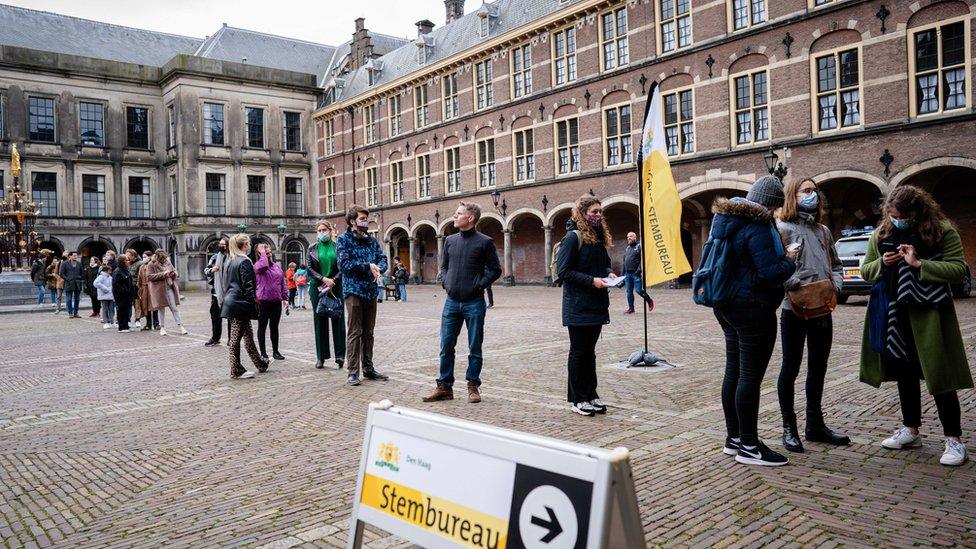
Voters queued to cast their ballots in The Hague
The Netherlands is governed by a proportional representation (PR) system and 37 parties took part in the race.
In order to calculate how seats are divided between the parties, the overall number of votes cast is divided by 150 - the number of seats in parliament.
Any party getting more than that number of votes is guaranteed at least one seat in parliament.
Related topics
- Published16 March 2021
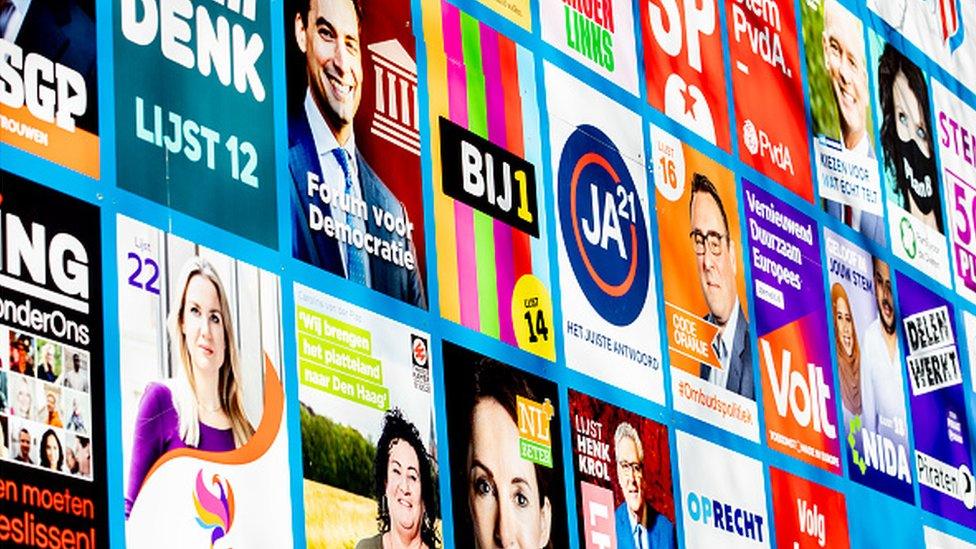
- Published15 January 2021
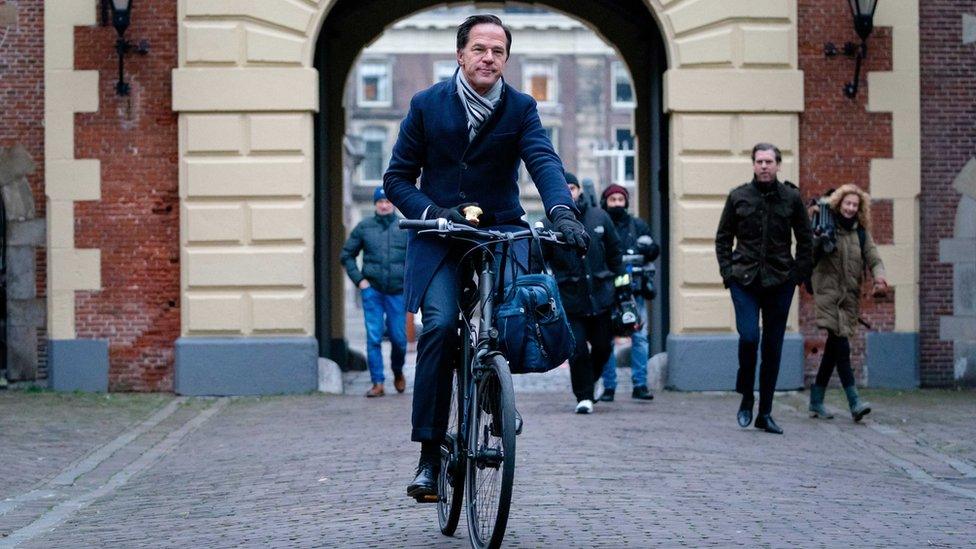
- Published6 January 2021
